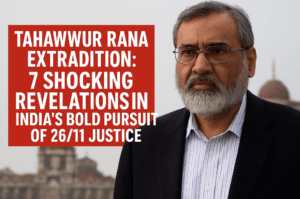Tahawwur Rana Extradition: 7 Shocking Revelations in India’s Bold Pursuit of 26/11 Justice
Tahawwur Rana’s extradition to India marks a critical juncture in the 16-year pursuit of justice for the 2008 Mumbai terror attacks, which killed 166 people. The Canadian businessman, convicted in the U.S. for aiding the Pakistan-based Lashkar-e-Taiba (LeT) and plotting a Denmark attack, was acquitted of direct involvement in Mumbai but faces Indian charges of conspiracy and terrorism. His childhood friend, David Headley—a U.S. informant turned LeT operative—testified that Rana’s immigration business provided cover for scouting attack sites.
After a protracted legal battle, U.S. courts approved his extradition, dismissing claims of torture risks, while India seeks to unravel alleged ties between the attacks and Pakistan’s intelligence apparatus. Rana’s trial could shed light on unanswered questions about state-sponsored terrorism and test international legal cooperation. For victims’ families, it represents a fragile hope for closure, underscoring the enduring fight against impunity in cross-border terrorism.
The case also highlights the complexities of balancing human rights concerns with national security imperatives in global justice systems.

Tahawwur Rana Extradition: 7 Shocking Revelations in India’s Bold Pursuit of 26/11 Justice
The extradition of Tahawwur Rana, a key figure linked to the 2008 Mumbai terror attacks, from the U.S. to India marks a pivotal moment in one of the most protracted counter-terrorism cases in modern history. Rana’s arrival in Delhi on June 20, 2024, reignites discussions about accountability, international legal cooperation, and the enduring scars of an attack that claimed 166 lives.
The Mumbai Attacks: A Nation’s Trauma
The 26/11 attacks, orchestrated by Lashkar-e-Taiba (LeT), saw 10 militants unleash three days of violence across India’s financial capital. Targets included the Taj Mahal Palace Hotel, Chhatrapati Shivaji Terminus, and a Jewish cultural center. The siege, which drew global condemnation, exposed gaps in transnational counter-terrorism efforts and highlighted Pakistan-based militant groups’ operational reach.
Rana’s Controversial Role
Rana, a Canadian citizen and Chicago-based businessman, was convicted in a U.S. court in 2013 for supporting LeT and plotting an attack on a Danish newspaper. However, he was acquitted of direct involvement in the Mumbai attacks. His childhood friend, David Headley—a U.S. informant turned LeT operative—testified that Rana’s immigration business provided cover for scouting attack sites. While Rana’s defense claimed he was duped by Headley, Indian prosecutors allege deeper complicity.
The 14-Year Legal Odyssey
Rana’s case underscores the complexities of international extradition:
- U.S. Conviction and Release: After serving 11 years of a 14-year sentence, Rana was briefly released in 2020 due to COVID-19 health risks but re-arrested pending India’s extradition request.
- Extradition Battle: U.S. courts greenlit Rana’s transfer in 2023, ruling that India’s charges (criminal conspiracy, waging war against the state) were distinct from his U.S. convictions. His appeals, citing risks of torture and poor prison conditions, were rejected by the Supreme Court in 2024.
- Diplomatic Layers: The U.S. State Department’s final approval reflects strengthened India-U.S. counter-terrorism ties under the 1997 Extradition Treaty, despite past tensions over Pakistan’s role.
Charges in India: What’s at Stake?
India’s National Investigation Agency (NIA) seeks to prosecute Rana under stringent anti-terror laws. His trial could:
- Uncover New Evidence: Investigators hope Rana’s testimony might reveal deeper links between LeT and Pakistan’s Inter-Services Intelligence (ISI), long accused by India of backing the attacks.
- Address Legal Gaps: While Headley turned approver (informant) in India’s 2016 in absentia trial, Rana’s physical presence allows cross-examination, potentially strengthening the case.
- Symbolic Closure: For victims’ families, Rana’s trial represents a belated step toward accountability. As Ujjwal Nikam, the lead prosecutor in 2008, noted, it may “expose Pakistan’s role” in the attacks.
Implications for Global Justice
Rana’s extradition sets precedents:
- Balancing Rights and Security: U.S. courts prioritized India’s sovereign right to prosecute over Rana’s human rights claims, signaling that terrorism charges often outweigh individual appeals.
- Intelligence Accountability: Headley’s dual role as a U.S. informant and LeT operative raises uncomfortable questions about intelligence oversight, a theme likely to resurface during Rana’s trial.
- Deterrence: Successful extraditions in terror cases could deter future perpetrators from exploiting legal loopholes in foreign jurisdictions.
The Road Ahead
Rana’s trial in India faces challenges, including ensuring a fair process amid public outrage and diplomatic sensitivities. Health concerns (he has coronary artery disease) and prison conditions will remain under scrutiny. Yet, his prosecution underscores a broader truth: the pursuit of justice for terrorism is a marathon, not a sprint.
For the families of the 166 victims, Rana’s day in court offers a fragile hope—that after 16 years, the wheels of justice, however slowly, continue to turn.
Why This Matters
- Transparency in Counter-Terrorism: Rana’s case tests the efficacy of international legal frameworks in addressing state-sponsored terrorism.
- Human Cost: Beyond legal jargon, the trial is a reminder of the civilians, security personnel, and foreign nationals whose lives were irrevocably altered on 26/11.
- Global Solidarity: As extremism evolves, Rana’s extradition reinforces the need for cross-border collaboration to combat terrorism’s fluid threats.
This chapter in the Mumbai attacks saga is far from closed, but it underscores a relentless pursuit of justice—one that transcends borders and decades.
You must be logged in to post a comment.